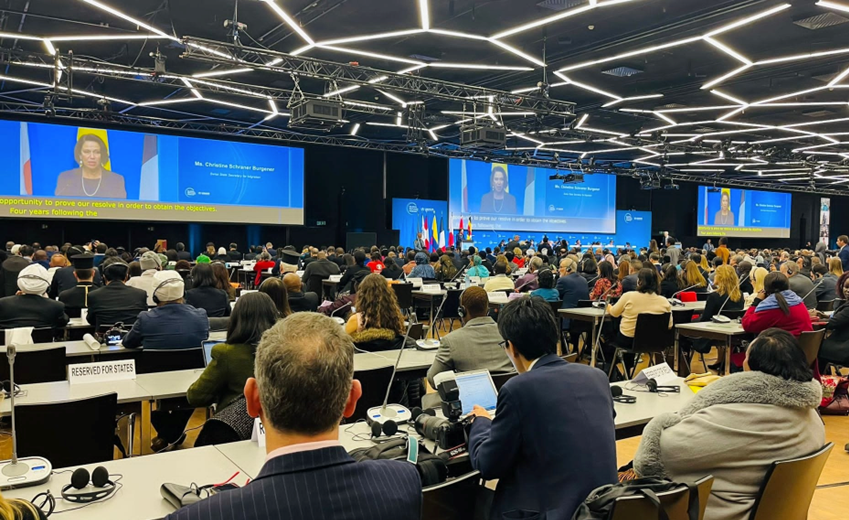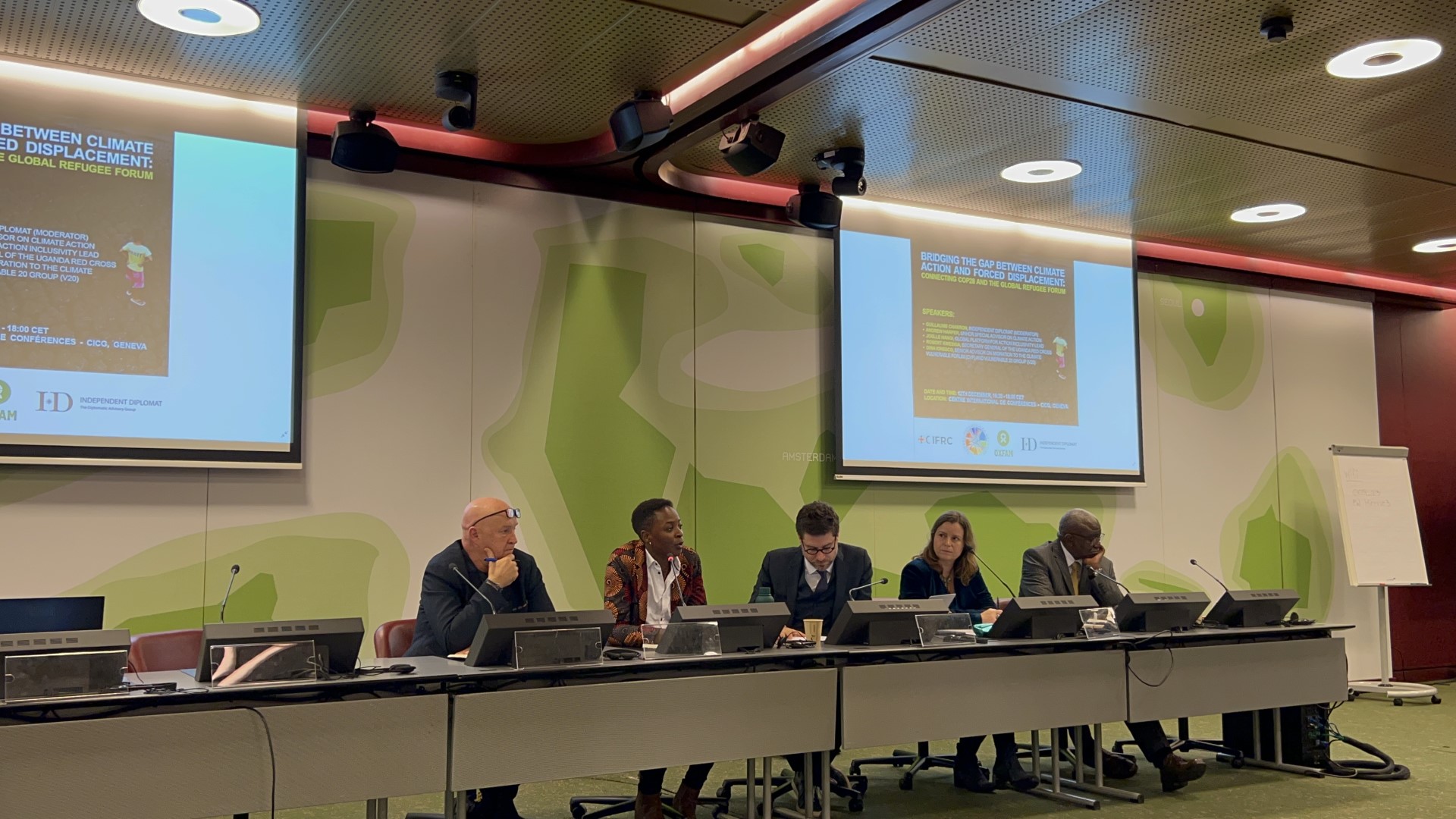In this section
In this sectionAs the Global Refugee-Led Network actively participated in the GRF 2023, the stage was set for a global dialogue that transcends borders, fostering a future where every voice counts in the fight against climate change. Together, these entities forge a path towards a tomorrow that is sustainable, inclusive, and shaped by the collective voice of the displaced, contributing significantly to the ongoing initiatives on inclusive climate action.

©GRN/Anila Noor. Global Refugee Forum 2023
The presence of refugee leaders at the GRF is not just an opportunity for the humanitarian world to learn about their fantastic work on climate action and the communities they represent and serve but also a platform to showcase their proactive role in addressing climate change. Refugees, facing climate change as a reality in various settings, are not merely waiting for some distant saviour. They develop unique solutions like energy-saving stoves, biogas cooking systems, and solar-powered cookers. They are at the forefront of planting trees and other ecosystem adaptation strategies. Refugee-led initiatives are leading the way in designing impactful, locally relevant, contextually fit, and acceptable solutions for and by refugees. Such solutions, born out of the lived experiences of refugees, are likely to succeed if supported and have higher chances of improving displaced persons' social, health, environmental, and economic conditions. In contrast, solutions shaped by those with limited knowledge about refugees' living experiences have little or no chance of success or being sustainable.
The GRF's objectives were to find long-term solutions for refugees, including enhancing self-reliance among refugees and promoting innovative approaches and best practices in addressing the refugee challenges. In addition, the GRF was held to facilitate partnerships among different stakeholders, including governments, civil society, and the private sector, to reinforce collaboration and coordination in responding to the refugee crisis.
Attending the GRF is a chance for many to connect with like-minded organisations and well-wishers, mobilise resources, and build partnerships to respond to refugee challenges. For example, in the run-up to the GRF, the Refugee-Led Network Organisation Network of Uganda (RELON) pledged to plant 7.5 million trees in response to reforestation efforts and climate action in Uganda. This is an example of a response that requires partnerships and support from donors, governments, local, national, and international organisations, as well as well-wishers who are usually easily accessible and present at gatherings like the GRF. Likewise, displaced persons’ delegations from other countries should use this opportunity to rally support for energy and climate action in displacement settings.
The presence of Refugee-Led Organizations (RLOs) leaders at GRF 2023 should raise critical concerns about the inclusivity and effectiveness of global initiatives addressing climate change and refugee challenges. For instance, it would be vital to have people with displaced backgrounds represented at the Refugee Environmental Protection (REP) Fund so that they can advocate for the direct flow of resources from REP to displaced persons’ initiatives working towards clean energy transition and environmental sustainability in displacement settings globally.
While the Global Refugee-Led Network and GRF aim to facilitate a global dialogue for a sustainable and inclusive future, the stark reality is that many voices from displaced communities representing some of the most affected regions do not hold decision-making powers. This is not just a gap but a critical concern. Without the meaningful representation and consideration of these voices, the GRF risks becoming a forum where decisions are made without a genuine understanding of the nuanced realities refugees face, making the motive of this forum questionable. This perpetuates a top-down approach, which has proven futile for a long period of time despite billions of dollars of investments and aid in displacement settings.

© GPA/Mariana Soto. GRF Side event: Bridging the gap between climate action and forced displacement connecting COP28 and GRF.
The very minimal attention attributed to the energy access topic at the GRF was a serious concern of the refugees' representatives, considering that clean energy access is a strong enabler of all other climate action ambitions and pledges in displacement settings and continues to deteriorate daily. The impact of poor energy access in displacement settings presents a severe threat with major negative impacts on the livelihoods, health, and incomes of displaced persons in the short and long run. This is one of the examples that made the refugee leaders question the interest and motivation behind the thematic area of focus, most importantly doubting the impacts of the forum in addressing the real challenges faced by the displaced population.
Moving forward, as the Global Refugee-Led Network actively engages in GRF 2023, the promising initiatives of displaced persons in climate action, energy-saving solutions, and tree planting should receive both financial and technical support. These projects demonstrate locally relevant and culturally acceptable strategies that hold significant promise in fostering the health and environmental aspects of their context, which are closely linked to their social and economic conditions. This highlights the importance of upholding the inclusivity of displaced persons to tackle climate change and respond to refugee challenges. While the GRF efforts for inclusivity are commendable, the stark reality remains that decision-making powers often elude voices from displaced communities, perpetuating a historically futile top-down approach. It is imperative to address this gap, ensuring that the GRF becomes a genuine platform to catalyse change, reflecting the nuanced realities faced by refugees and effectively leveraging resources towards sustainable solutions in displacement settings globally.
This blog was written by Epa Ndahimana and Joelle Hangi of the GPA, and Arushi Tangri of the GRN as part of the deliverables of theTransforming Humanitarian Energy Programme (THEA) funded by the UK government's Transforming Energy Access (TEA) programme.
Last updated: 19/01/2024
